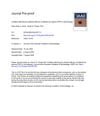 3 citations,
September 2022 in “Frontiers in psychiatry”
3 citations,
September 2022 in “Frontiers in psychiatry” University students in Egypt experienced high stress during COVID-19's third wave, with negative coping mechanisms being more common.
 July 2024 in “Occupational Medicine”
July 2024 in “Occupational Medicine” Higher cortisol levels are linked to poor coping, while higher DHEA levels are linked to job confidence.
 May 2024 in “CRC Press eBooks”
May 2024 in “CRC Press eBooks” Children's hair loss can have various causes, including infections, autoimmune issues, physical stress, nutritional problems, and genetic factors.
[object Object]  March 2014 in “Journal of The American Academy of Dermatology”
March 2014 in “Journal of The American Academy of Dermatology” Vitamin D deficiency is common in temporary hair loss, and stress is often a suspected cause.
 20 citations,
January 2003 in “Journal of oleo science”
20 citations,
January 2003 in “Journal of oleo science” Chemical treatments and daily stresses damage hair, especially the cuticle layer.
 3 citations,
May 2019 in “Australasian Journal of Dermatology”
3 citations,
May 2019 in “Australasian Journal of Dermatology” Hair loss in Cronkhite-Canada syndrome may be caused by autoimmune factors, not just stress or malabsorption.
 1 citations,
September 2015 in “Clinics in Dermatology”
1 citations,
September 2015 in “Clinics in Dermatology” The guide helps doctors diagnose hair problems by suggesting a thorough patient history, physical exams, and various diagnostic tools.
 176 citations,
June 2017 in “Sexual Medicine Reviews”
176 citations,
June 2017 in “Sexual Medicine Reviews” Erectile dysfunction is increasingly common in men under 40, with many physical and psychological causes, and various treatment options available.
 7 citations,
February 2022 in “JAAD International”
7 citations,
February 2022 in “JAAD International” COVID-19 may be linked to hair loss or worsening of hair loss in some people.
 December 2020 in “Journal of Pakistan Association of Dermatology”
December 2020 in “Journal of Pakistan Association of Dermatology” COVID-19 recovery can lead to temporary hair loss called telogen effluvium.
 January 2018 in “Elsevier eBooks”
January 2018 in “Elsevier eBooks” The document concludes that alopecia has various forms, each with specific treatments, but no definitive cure for certain types like CCCA has been proven.
108 citations,
October 2003 in “Journal of biological chemistry/The Journal of biological chemistry” Trichohyalin makes hair follicles stronger.
 63 citations,
March 1998 in “Archives of Dermatology”
63 citations,
March 1998 in “Archives of Dermatology” Antidepressants may improve or resolve scalp dysesthesia in most patients.
 20 citations,
July 2009 in “Journal of Pediatric and Adolescent Gynecology”
20 citations,
July 2009 in “Journal of Pediatric and Adolescent Gynecology” Quick treatment of hair disorders in teenage girls is important because of the emotional effects.
 17 citations,
January 1995 in “The American Journal of Medicine”
17 citations,
January 1995 in “The American Journal of Medicine” The document concludes that proper diagnosis and tailored long-term treatment can effectively manage androgenic disorders in women, improving patient care outcomes.
 9 citations,
August 2020 in “Journal of The American Academy of Dermatology”
9 citations,
August 2020 in “Journal of The American Academy of Dermatology” Many factors, like patient health and how PRP is made, can affect how well PRP therapy works in skin treatments.
 September 2022 in “Journal of Case Reports and Medical History”
September 2022 in “Journal of Case Reports and Medical History” Many new moms lose hair after childbirth due to hormonal changes, but it usually grows back within a year.
[object Object]  34 citations,
August 2005 in “Dermatologic Clinics”
34 citations,
August 2005 in “Dermatologic Clinics” Stress and emotional factors can worsen skin conditions by affecting the immune system.
 127 citations,
December 2005 in “Experimental Dermatology”
127 citations,
December 2005 in “Experimental Dermatology” Stress can stop hair growth in mice, and treatments can reverse this effect.
 40 citations,
November 2011 in “American Journal of Human Biology”
40 citations,
November 2011 in “American Journal of Human Biology” Stress from being transgender is linked to higher blood pressure at night and more inflammation, which may affect heart health.
 2 citations,
January 2013 in “Advances in Experimental Medicine and Biology”
2 citations,
January 2013 in “Advances in Experimental Medicine and Biology” Taurine might help prevent hair loss caused by stress.
 159 citations,
December 2007 in “American Journal of Pathology”
159 citations,
December 2007 in “American Journal of Pathology” Stress-related substance P may lead to hair loss and negatively affect hair growth.
 197 citations,
January 2019 in “Neuropsychopharmacology”
197 citations,
January 2019 in “Neuropsychopharmacology” Male and female bodies respond differently to stress, influenced by hormones and development stages, with implications for stress-related diseases.
 February 2008 in “Experimental dermatology”
February 2008 in “Experimental dermatology” Oxidative stress plays a significant role in vitiligo, and both skin and non-skin cells may be involved.
 August 2024 in “International Journal of Health Science”
August 2024 in “International Journal of Health Science” Telogen Effluvium (TE) significantly affects women due to stress and hormonal changes, requiring better public health policies and mental health support.
 19 citations,
January 2013 in “Journal of Cutaneous Medicine and Surgery”
19 citations,
January 2013 in “Journal of Cutaneous Medicine and Surgery” Alopecia patients struggle with emotions and stress, and improving emotional intelligence may help manage hair loss.
 6 citations,
January 2021 in “Journal of Cosmetic Dermatology”
6 citations,
January 2021 in “Journal of Cosmetic Dermatology” Poor sleep during the pandemic may increase stress and worsen hair loss conditions.
 65 citations,
March 2018 in “Journal of Dermatological Science”
65 citations,
March 2018 in “Journal of Dermatological Science” Skin problems can be caused or worsened by physical forces and pressure on the skin.
November 2024 in “Psychoneuroendocrinology” Testosterone increases hair testosterone levels, stress raises hair cortisol, and relationship status affects hormone levels.
44 citations,
February 2016 in “Zoology” Hair cortisol levels in primates are useful for stress assessment but vary by age, sex, species, and hair collection methods.


























